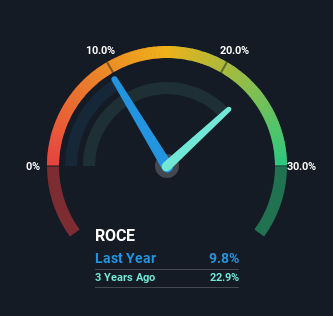- Poland
- /
- Telecom Services and Carriers
- /
- WSE:KOR
There Are Reasons To Feel Uneasy About Korbank's (WSE:KOR) Returns On Capital

If we want to find a potential multi-bagger, often there are underlying trends that can provide clues. One common approach is to try and find a company with returns on capital employed (ROCE) that are increasing, in conjunction with a growing amount of capital employed. Ultimately, this demonstrates that it's a business that is reinvesting profits at increasing rates of return. In light of that, when we looked at Korbank (WSE:KOR) and its ROCE trend, we weren't exactly thrilled.
Return On Capital Employed (ROCE): What Is It?
For those that aren't sure what ROCE is, it measures the amount of pre-tax profits a company can generate from the capital employed in its business. To calculate this metric for Korbank, this is the formula:
Return on Capital Employed = Earnings Before Interest and Tax (EBIT) ÷ (Total Assets - Current Liabilities)
0.098 = zł5.5m ÷ (zł64m - zł8.2m) (Based on the trailing twelve months to June 2023).
Therefore, Korbank has an ROCE of 9.8%. On its own, that's a low figure but it's around the 8.2% average generated by the Telecom industry.
View our latest analysis for Korbank

While the past is not representative of the future, it can be helpful to know how a company has performed historically, which is why we have this chart above. If you'd like to look at how Korbank has performed in the past in other metrics, you can view this free graph of past earnings, revenue and cash flow.
So How Is Korbank's ROCE Trending?
When we looked at the ROCE trend at Korbank, we didn't gain much confidence. To be more specific, ROCE has fallen from 14% over the last five years. Although, given both revenue and the amount of assets employed in the business have increased, it could suggest the company is investing in growth, and the extra capital has led to a short-term reduction in ROCE. If these investments prove successful, this can bode very well for long term stock performance.
On a side note, Korbank has done well to pay down its current liabilities to 13% of total assets. So we could link some of this to the decrease in ROCE. What's more, this can reduce some aspects of risk to the business because now the company's suppliers or short-term creditors are funding less of its operations. Since the business is basically funding more of its operations with it's own money, you could argue this has made the business less efficient at generating ROCE.
What We Can Learn From Korbank's ROCE
In summary, despite lower returns in the short term, we're encouraged to see that Korbank is reinvesting for growth and has higher sales as a result. And the stock has done incredibly well with a 267% return over the last five years, so long term investors are no doubt ecstatic with that result. So while investors seem to be recognizing these promising trends, we would look further into this stock to make sure the other metrics justify the positive view.
On a final note, we found 5 warning signs for Korbank (3 are a bit concerning) you should be aware of.
If you want to search for solid companies with great earnings, check out this free list of companies with good balance sheets and impressive returns on equity.
Valuation is complex, but we're here to simplify it.
Discover if Korbank might be undervalued or overvalued with our detailed analysis, featuring fair value estimates, potential risks, dividends, insider trades, and its financial condition.
Access Free AnalysisHave feedback on this article? Concerned about the content? Get in touch with us directly. Alternatively, email editorial-team (at) simplywallst.com.
This article by Simply Wall St is general in nature. We provide commentary based on historical data and analyst forecasts only using an unbiased methodology and our articles are not intended to be financial advice. It does not constitute a recommendation to buy or sell any stock, and does not take account of your objectives, or your financial situation. We aim to bring you long-term focused analysis driven by fundamental data. Note that our analysis may not factor in the latest price-sensitive company announcements or qualitative material. Simply Wall St has no position in any stocks mentioned.
About WSE:KOR
Korbank
A telecommunications operator, provides various services to companies, institutions, and housing estates in Poland and internationally.
Good value slight.


